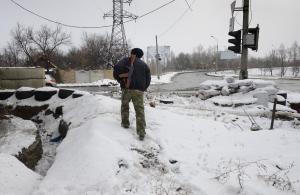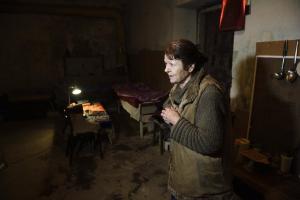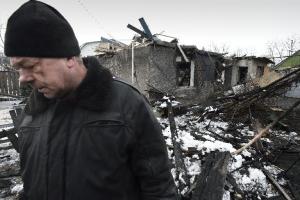Donetsk (Ukraine) (AFP) - A three-day-old ceasefire in eastern Ukraine was under pressure on Thursday after three government soldiers were killed, while European nations raised new fears about Russia's "unprecedented" military build-up.
On some parts of the frontline, there appeared to be a determined effort to keep the shaky truce from collapsing.
Government soldiers could be seen blithely ignoring rebel forces firing on their position at the hotly contested Donetsk airport.
"Our adversaries started to provoke us, to fire on our positions. I did not give the order (to fire back)," said a commander going by the name "Coupol".
"They ended up calming down."
But the military said three soldiers had been killed and eight injured in the past 24 hours.
View gallery

A seperatist rebel fighter walks towards a check-point on December 9, 2014 in the Kuibishevskiy dist …
"Terrorists are violating agreements and continuing to fire on positions of the Ukrainian military and civilians. Tanks and artillery were used, but our forces did not respond," said military spokesman Andriy Lysenko.
Rebel commanders in Donetsk denied they had carried out any attacks and said government forces had breached the ceasefire on five occasions.
"Our weapons are not being used and we are not firing back," said deputy chairman of the rebel administration, Denis Pushilin.
- Concern in Europe -
The deaths will cast doubt on the prospects of this latest ceasefire -- the fourth since the conflict erupted in April.
View gallery

A woman stands in the cellar of her building, often used as a shelter, in Kievskiy district in the e …
The process is being closely watched in Europe, where concerns over Russia's support for the rebels has plunged East-West relations to their lowest ebb since the end of the Cold War.
The heightened atmosphere has also prompted Sweden to moot the possibility of recalling around 7,500 recent veterans to form a reserve voluntary force.
"The world has changed in a negative way, partly as a result of Russia's rearmament, partly due to the annexation of Crimea, and partly due to the armed conflict in Ukraine," Swedish Defence Minister Peter Hultqvist told local station SVT on Thursday.
Poland's defence minister meanwhile said he was concerned by the extent of Russia's recent military activity over the Baltic sea.
On Monday, Dutch F-16 fighters intercepted two Russian bombers over the Baltic Sea as part of their participation in NATO's Baltic air policing mission.
View gallery

Latvian troops preparing for live-fire exercises at the Adazi military base outside Riga on November …
All told, more than 30 Russian aircraft were intercepted in international airspace "over the Baltic Sea and off the coast of Norway" on Monday, a NATO spokesman said.
"For a few days now, there has been unprecedented Russian activity, from its Baltic fleet to flights over the Baltic sea," Defence Minister Tomasz Siemoniak told Polish broadcaster TVN24.
Poland and the Baltics -- Estonia, Latvia and Lithuania -- have been on edge since Russia annexed the Crimean peninsula from Ukraine in March and, according to the West, began supporting the rebels battling government forces in eastern Ukraine.
NATO has deployed more aircraft, ships and personnel in a bid to reassure the four countries, all new members formerly dominated by Moscow.
There have been around 400 intercepts of Russian military flights near NATO member countries this year, the Western defence alliance said last month.
View gallery

A man stands next to his house, destroyed by shelling in the Kuibishevskiy district of the eastern U …
Lithuania put its military on higher alert on Monday after 22 Russian warships were spotted in the Baltic Sea.
- 'Everything is calm' -
Despite some ceasefire breaches in eastern Ukraine, the worst of the shelling appeared to have stopped.
In the main separatist stronghold of Donetsk, "the night passed without large bombardments", the city authorities said in a statement on Thursday.
Other parts of the frontline appeared peaceful on both sides.
In the village of Tonenke, a short distance from Donetsk airport, a Ukrainian military unit said there had been no exchanges.
"Everything is calm, no one is firing. There have not been any bombardments either in the night or morning," one soldier, Mikhail, told AFP by phone.
The ceasefire was introduced on Tuesday in the hope of ending an eight-month conflict that has claimed at least 4,300 lives and displaced close to a million people, according to United Nations figures.
The two sides -- along with Russian and European monitors -- are still trying to organise comprehensive peace talks.
The Ukraine government had initially hoped to hold talks in the Belarus capital Minsk on Tuesday but they have been postponed without clear explanation.